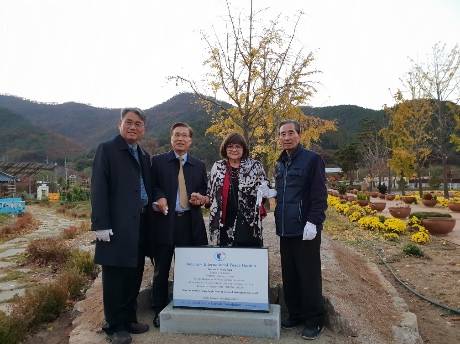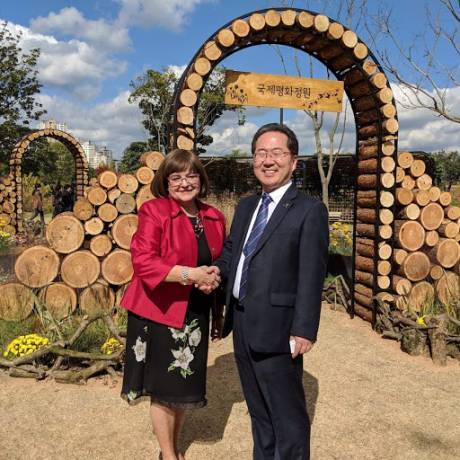
Above photo: Commemorative marker in the International Peace Garden at No Gun Ri Peace Park and flanked by Paula Savage, South Korean officials and, on the right, one of only two known survivors of the July 1950 No Gun Ri massacre.
When Paula Savage, of Batavia, founded the first International Peace Garden in 1990, little did she know her efforts would result in a trail which would stretch around the world.
Savage was working in Washington, D.C., for Canadian tourism at the time and was asked to create a project signifying the special relationship between Canada and the United Sates, since the two countries have shared the longest undefended border in the world since 1812.
The first Peace Garden was dedicated in 1991 in Washington, D.C., starting a tradition which continues today, spanning five continents as Peace Gardens are passed from country to country. There are now 23 in the world, Savage said.
When Western New York was getting ready to celebrate the bicentennial of the War of 1812, the Bicentennial Committee knew of the International Peace Gardens and asked Savage to create a Peace Garden Trail along the border to commemorate this important anniversary.
Creating a Peace Garden Trail
The first Peace Garden in this trail sprang up in 2012 at a historic battle site along the Niagara River, followed by 13 others in New York State, one of the most elaborate being in Batavia.
The United States had chosen Poland in 1991 as the next country to receive a Peace Garden, because it was the first country in Eastern Europe to achieve democracy, Savage said.
For some reason, however, Poland never received its stone marker for its Peace Garden, something which is finally scheduled to occur in late June in Warsaw, Poland.
“It has always been my intention to deliver the official stone to those countries that were honored,” Savage said. “Details of the ceremony have not yet been released, but I plan to bring the stone to Warsaw, ceremony or not, at the end of June.”
The most recent commemorative International Peace Garden stone was dedicated in late 2018 in South Korea and, keeping with her custom with every new Peace Garden, Savage attended the dedication, an experience she said was exceptional.
“When does a native of Batavia get to stand with costumed children and top officials of a country like South Korean on a historic site, having brought them all together to celebrate world peace?” Savage asked.
“One thing which was very profound was that the committee which organized our tour said we were visiting a site which would be an honorary Peace Garden.”
Making Peace at a Massacre Site
Savage and her group was taken to a village 100 miles southeast of Seoul where the No Gun Ri massacre occurred July 26-29, 1950, when soldiers from the 2nd Battalion, 7th U.S. Calvary and a U.S. air attack killed an estimated 250-300 South Korean civilian refugees, mostly women and children.
“We were out in a rural area in a huge parking lot,” Savage said. “There was a theater and they showed us a movie. During the Korean War, the United States occupied this part of the country and the U.S. was planning a big battle in this area. Refugees fleeing the village got stuck here under the bridge.
“An American general on the phone with the unit said to shoot them. It was a massacre by our own government. They were devastated. The country has been waiting for the U.S. to apologize, but they never did.
"I’m glad there’s going to be a Peace Garden there. I’m sorry this tragedy had to happen, but if there’s a way through our Peace Garden to help Korea heal, then we have done our part.”
Savage had previously made a certificate and gave it to the executive director of their Memorial Day observance and they had enlarged it and encased it in a stone monument at the site.
Savage said she will never forget standing there with one of only two survivors of the No Gun Ri massacre.
Currently, Savage said the landmines are being removed from along the DMZ -- demilitarized zone -- and it has been suggested they be replaced with Peace Gardens.
Paying It Forward
“Every time I go to a different country, I see the significance of the Peace Garden to that area,” Savage said. “They have made amazing differences to so many around the world, such as the garden Poland gave to Germany after what Germany did to Poland in World War II.”
As is tradition, each country who dedicates a Peace Garden then chooses the country to have one the next year. Savage has attended the openings of every one around the world.
The original International Peace Garden was a tulip garden, celebrating a tradition started 75 years ago, when the Netherlands gave the first gift of tulips to Ottawa, Ontario, Canada.
This year 2019 will mark the 75th anniversary of that gift, which came about when Princess Julianna of the Netherlands was expecting. They knew the Germans were coming and the family fled to Ottawa, where the city allowed the Dutch flag to be flown over Parliament for one day, so the child, named Princess Marguerite, could be born a Dutch citizen.
Savage has had the privilege of meeting Princess Marguerite, she said.
Thus, when Canada gave the first garden to the United States, it had to be tulips, Savage said.
In 1992, Savage found a way to expand on the International Peace Garden when she founded the International Peace Garden Foundation.
“I had met a composer in Las Vegas and told him about how the gardens were developing,” Savage said. “He wrote a symphony for tulips, but said you can’t have music with no strings attached. He told me I must establish a scholarship for the underprivileged in the arts.”
The composer was Thomas Deering, whose parents couldn’t afford to send him to college. He became self-taught.
“I thought about how much more we could do than a music scholarship,” Savage said.
The Foundation has been blessed with monetary donations and gifts in kind. A student in Washington, D.C., has received financial assistance; an instrument has been purchased for a child in Poland; money has been sent to help a school in Slovania.
One of the most heartwarming cases is the 14-year-old boy from our nation's capital whom Savage met and set up a concert gala for him at the Polish embassy.
“I asked him what his dream was and he said it was to perform at Carnegie Hall,” Savage said. “I told him I didn’t have powerful contacts, but whatever I could do to make that happen, I would.”
A month later, Savage was in New York City on a business trip and went to Carnegie Hall. She told them her story and they were all moved. Three months later, the young boy, named Henry, was in full concert with Thomas Deering at Carnegie Hall, wearing a tuxedo Savage had bought him.
“The Canadian government paid for a huge reception for him after,” Savage said. “At that point, I knew we were onto something spectacular. The last I heard, Henry had gone back to New York City and was performing on Broadway.”
Accolades for the Peace Lady
The experience has not been without its rewards for Savage, she said. In 2000, she was presented with the “Merits of Two Worlds” award, which recognizes contributions made by individuals who help unite the countries of Europe. In 2012, Savage was honored with the “World Harmony Torch Bearer Medal” during a ceremony at the United Nations.
In 2018, Savage launched the International Peace Garden Registry. Through the Internet, the registry gives individuals and communities the opportunity to share their stories and images of the world. Details are available here.
The International Peace Garden Foundation is a 501c3 nonprofit and tax-dedictible donations may be made online here or by calling Savage at (585) 300-9252.
Although Savage is very proud of what she has accomplished throughout the world, she is also passionate about her roots in Batavia.
As a graduate of Genesee Community College, she said the college considers her one of their success stories and sends out releases promoting her endeavors every chance they get. She has just completed a release on her recent visit to Korea and will be sending it to GCC.
“For the college, it is a way for them to take a bit of credit for my success, and hopefully attract new enrollments,” Savage said.
Photos courtesy of Paula Savage.
Below, Paula Savage meets mayor Seok Huh in Suncheon City, South Korea, which is the site of the International Peace Garden dedicated in late 2018.

